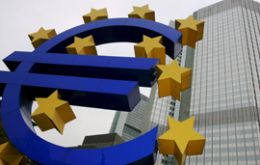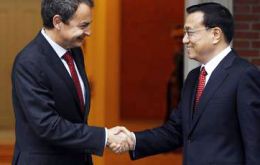MercoPress. South Atlantic News Agency
Tag: debt crisis
-
Saturday, October 29th 2011 - 10:49 UTC
China sets out terms for supporting the Euro bail package

The European Union (EU)'s new bailout deal reached Thursday served a boost to global markets. China, as a major trade partner with the EU, welcomes its step to tackle the debt crisis and expects to enhance cooperation with the regional bloc for world economic recovery.
-
Wednesday, October 19th 2011 - 23:07 UTC
Greeks have transferred to Swiss banks 200 billion Euros, claims German press

Greeks fearing the safety of their deposits in banks, as well as Greeks trying to evade paying taxes, have reportedly “bailed out” their money of the debt struck country into the safe haven of Swiss banks in a scale of 200 billion Euros.
-
Saturday, July 9th 2011 - 06:51 UTC
Obama says debt-limit controversy fuelling uncertainty in the business sector

President Barack Obama cited gloomy jobs numbers as one more reason lawmakers must strike a deal soon to raise the US debt limit, saying the impasse was fuelling uncertainty within financial markets and in the business sector.
-
Friday, June 3rd 2011 - 23:19 UTC
Greece is not Uruguay; the Athens debt case is more like Argentina, says economist

Past voluntary debt re-profiling in Latin America have worked to varying degrees, but “soft” restructuring is not going to solve Greece's debt problems, according to Stuart Culverhouse, chief economist of frontier markets specialist Exotix.
-
Tuesday, May 17th 2011 - 00:44 UTC
Euro aid package for Portugal approved but private bond holders also involved

Euro zone finance ministers approved Monday a three-year, 78-billion Euro emergency loan program for Portugal and said Lisbon would ask private bondholders to maintain their exposure to its debt.
-
Thursday, January 6th 2011 - 11:10 UTC
As with Greece and Portugal, China comes to Spain’s rescue; 7.5 billion deals

China and Spain signed this week business deals worth 7.5 billion US dollars, a welcome boost for Spain's recession-hit economy. Visiting Vice-Premier Li Keqiang also vowed to help Europe overcome its debt crisis (and support the Euro), as he started his three-nation European tour.
-
Wednesday, December 8th 2010 - 04:56 UTC
IMF criticizes Europe’s disjointed response to the Euro debt crisis

The head of the International Monetary Fund criticized Europe's disjointed response to the Euro zone debt crisis after Germany and other states resisted his calls for bolder action.
-
Friday, November 12th 2010 - 18:01 UTC
Europe ratifies support for Ireland’s budget policy and sovereign debt

Irish Finance minister Brian Lenihan has welcomed a statement of support over Ireland's debts from Germany, Britain, France, Italy and Spain. The five countries attending the G20 summit in South Korea said that bondholders would not be forced to share the pain of the current debt crisis.
-
Tuesday, November 9th 2010 - 01:47 UTC
IMF warns about possible “full blown sovereign debt crisis” in rich nations

Risks are still high that developed nations will face difficulties in rolling over their debt and possibly trigger a crisis the International Monetary Fund said in its “Fiscal Monitor” report released this month.
